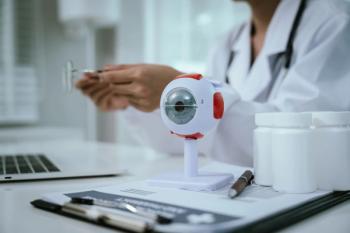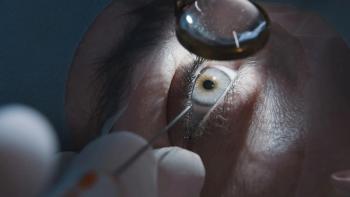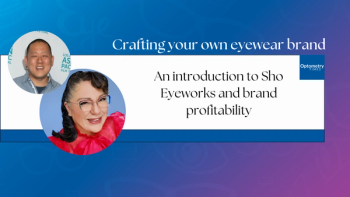
EyeCon 2022: Co-chairs open with a focus on the future of optometry
Optometry Times' EyeCon co-chairs Kelly K. Nichols, OD, MPH, PhD, FAAO, and A. Paul Chous, MA, OD, FAAO, reflect on the 2023 EyeConversations keynote address, which covered new technology, artificial intelligence, and an update in pharmacology.
Optometry Times' EyeCon co-chairs Kelly K. Nichols, OD, MPH, PhD, FAAO, and A. Paul Chous, MA, OD, FAAO, reflect on the 2023 EyeConversations keynote address, which covered new technology, artificial intelligence, and an update in pharmacology.
This transcript has been edited for clarity:
Nichols:
Hello, everyone. I'm Kelly Nichols. I am the co-chair with Dr. Chous here. I am the Dean and professor at the University of Alabama Birmingham School of Optometry and it's just an honor to co chair this meeting here today.
Chous:
I'm Paul Chous. I'm in Tacoma, Washington; I have a practice that emphasizes diabetes. And it's been a joy to have our first session this morning, which was the keynote talk. We had a, an interesting panel kind of people for different subspecialty areas talking about various aspects of practice, enriching all of us, I think.
Nichols:
Yeah, yeah, I thought it was a really nice approach to start off a meeting to get a little bit about the highlights of these particular fields, and then sort of as a teaser for some of the lectures that are going to be happening over the next two days. So it was really good. It was nice to have optometry and ophthalmology co-chairs together. I think that was maybe almost a first, so it was very exciting that we were being hosted by Optometry and Ophthalmology Times. So Paul, what was--what was something that stood out to you?
Chous:
Well, so one of the talks that I found most kind of relevant is just practice burnout and self-care. What can we do to kind of re-engage ourselves with our, with our practices, and you know, how prevalent is the phenomenon? So I think we got good feedback from everybody on the panel about, you know, strategies for making practice more enjoyable and not being burned out so quickly. How about you, Kelly?
Nichols:
Well, I also liked it that it involved technology. So there are things that we can do in order to, you know, fix our work environment that will allow for us to maybe be more comfortable and have less injury, perhaps, as we go forward. So that was good, too.
I liked how there were comments from the audience, as well as the panel about the future, like with optometry and--optometry students, ophthalmology residents and what, what care will look like as we move forward, related to the self-care and quality of life, and you know, sort of having a work-life balance. So that was a nice discussion as well, don't you think?
Chous:
Absolutely. Dr. Nichols did a fabulous job talking about new mechanisms for delivery of ocular drugs and the like. So that was fascinating. Something that I think in the next few years, we can look to an explosion probably of these sorts of products on the marketplace for our patients.
Nichols:
Yeah, absolutely. And another thing that we kind of started this session off with was AI. AI and optometry and ophthalmology and how, really the next 10 years are going to be--are going to change hugely in terms of the amount of technology that we see and the reliance on technology for better patient care. And I think that's the important thing. It's not going to replace us as practitioners; it's going to enhance our ability to take care of our patients and provide better outcomes.
Chous:
Yeah, I think that's right. There's there's a lot of fear out there, at least in our profession, and people I've talked to about artificial intelligence replacing us, but hopefully, what it will do is help us do our jobs better, right? So you can stratify people by their risk using AI as a tool for you, the human examiner, to give your patients better care.
Nichols:
And will you go ahead and mention a little bit about the diabetes part of that?
Chous:
Oh, so I talked a little bit in terms of artificial intelligence. Yeah, I talked a bit. I talked just a bit about diabetes, and some of the things we need to be aware of in terms of using continuous glucose monitoring, particularly in all patients, whether they have type 1 or type 2 diabetes, who were on insulin therapy as a way of improving their quality of life actually lowering their blood glucose levels over time, lowering the risk of eye disease. And just the fact that the most important time to intervene in any patient with diabetes life is before they have retinopathy or when it's mild, because I showed some data that indicates that if we wait for retinopathy to get worse, tightening your glucose control really is ineffective at preventing the disease from progressing on further.
Nichols:
I think that highlights the importance of prevention, primary prevention and trying to get at it before it even exists. So, so looking forward to the rest of the meeting and hearing the rest of the talks today and tomorrow. Very exciting stuff is planned. And we hope that our viewers online as well as our attendees in person will enjoy it.
Chous:
Absolutely. So excited to lecture with and, and present with Dr. Nichols, who's one of my heroes in the profession.
Nichols:
Aw, you're too sweet. You too.
Chous:
Great, thanks so much. Thanks. Have a great show.
Newsletter
Want more insights like this? Subscribe to Optometry Times and get clinical pearls and practice tips delivered straight to your inbox.













































